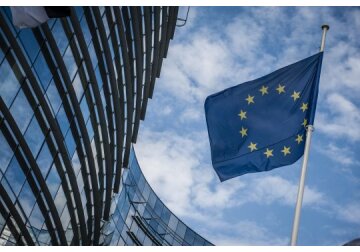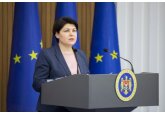
Moldova needs to attract more investments in strategic infrastructure, develop the business environment, improve the management of the state-owned sector, reduce the energy intensity of the economy - European Commission.
This is stated in the materials of the European Commission published on Friday, which analyze Moldova's compliance with the EU membership criteria. In particular, it is emphasized that Moldova is pursuing a generally prudent macroeconomic policy, but the lack of political will and frequent changes in government sometimes led to uneven reforms. In the last decade, Moldova has managed to maintain economic growth at an average rate of about 4.5% per year and survive several economic crises. Public finances have been stable, with low deficits, around 1.5% of GDP on average over 2013-2020, and robust debt levels (about 32% of GDP in 2021, most of which is held by external partners on concessional terms). Prior to the global inflationary pressure caused by the war in Ukraine, the National Bank of Moldova was generally able to keep inflation within the target range of 5% (+/-1.5 pp), while the managed floating exchange rate regime maintained a stable national currency. As a result of the rapid rise in energy and food prices, rising inflation, which amounted to 22% by the end of Q1 2022, is one of the key challenges for Moldova's macroeconomic stability in the future, in addition to housing costs and a large influx of Ukrainian refugees. The current account deficit has averaged 7.3% of GDP over the past 10 years, mainly due to the large trade deficit. The latter was driven by strong domestic demand backed by large remittances, unfavorable terms of trade and a relatively weak export base. However, thanks to the significant support of international partners, Moldova managed to significantly increase its foreign currency reserves. As noted, Moldova's state enterprises sector remains large, comprising about 900 companies, which together own about 26% of GDP in assets and employ about 6% of the active workforce. The sector continues to suffer from a lack of good corporate governance practices, inefficiencies and poor oversight. This further undermines private sector investment and the competitiveness of the economy as a whole and creates fiscal risks. The EC believes that further reforms are needed, especially those related to improving corporate governance, reorganization, privatization and liquidation of unviable companies. In addition, the informal sector remains relatively large, accounting for 27% of GDP in 2020. Moldova's financial sector has undergone significant reforms, especially after banking fraud in 2014, which amounted to the equivalent of 12% of GDP. Since then, key systemic banks have been restructured and most of the shares have been sold to transparent international shareholders. At present, the Moldovan banking sector appears to be well capitalized, all banks comply with the capital adequacy ratio, and the share of non-performing loans has decreased significantly in recent years. Successful reforms in the banking sector have recently improved access to finance, in particular for small and medium-sized enterprises. However, financial intermediation remains low: the share of loans provided to the private sector, on average, in 2017-2021 was 20% of GDP. In addition, overall progress in recovering stolen assets and litigating bank fraud has been slow and non-transparent. The labor market is characterized by significant structural weaknesses, as evidenced by the very low employment rate of about 49% in 2020. This is partly due to the high share of informal employment, in particular in the agricultural sector and construction. There is also a mismatch between skills and job requirements. Quality job creation is constrained by a lack of private and foreign investment in higher value-added sectors. It is noted that Moldova suffers from a low level of qualification and compliance due to the low quality of education and significant emigration of qualified personnel. Moldova's physical infrastructure remains relatively underdeveloped, despite significant support from international partners and significant investment from the government. The energy sector suffers from key structural weaknesses. Moldova is completely dependent on gas supplies from Russia and has no storage facilities on its territory, which makes it extremely vulnerable to the supplier. The electricity market suffers from similar problems, with little diversification of energy resources and underdeveloped infrastructure. Thus, the unbundling of energy companies is one of the key priorities going forward. The materials of the European Commission indicate that the Moldovan economy is not very diversified and is still heavily dependent on the agricultural sector, which makes it less productive and especially vulnerable to climatic conditions. Agriculture accounts for about 12% of Moldova's official GDP (as of 2021), with informal subsistence agriculture accounting for another 11% of GDP. Food, agricultural products and other goods account for almost half of Moldova's exports, indicating its weak export structure and the need to move up global value chains. The manufacturing sector remains relatively weak, with its share of GDP declining from 15.4% in 2016 to 12.4% in 2021. However, the IT sector has seen notable growth, especially since the pandemic, and this is reflected in its growing contribution to GDP growth. The conclusions and recommendations of the EC indicate that in terms of economic criteria, Moldova pursues a prudent macroeconomic policy, it has significantly strengthened the stability of the financial sector and improved the business environment. Moldova needs to address gaps to attract more foreign private investment and increase public and private investment in strategic infrastructure, education and innovation. Key areas for improving the functioning of the market economy also include reducing corruption and reforming the justice system, enforcing property rights, further developing a more dynamic business environment, and improving corporate governance reform of the SE sector to reduce its size. Similarly, improvements in energy security are needed to reduce the energy intensity of the economy and society. In addition, the country's ability to cope with competitive pressures in the EU will depend on a more resilient and diversified labor market and a reduction in labor exodus, increasing Moldova's growth potential and its external competitiveness.// 17.06.2022 — InfoMarket







